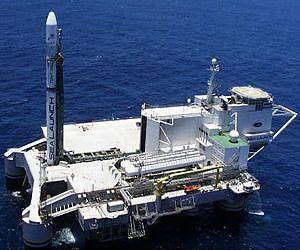A Russian rocket carrying a US telecoms satellite plunged into the Pacific Ocean on Friday only moments after being launched from a mobile sea platform in Moscow's latest space failure.
The rocket may have veered off course from the moment of take-off because of heavy waves battering the former northern seas oil platform, initial reports said.
The Intelsat-27's loss means the giant Boeing aerospace corporation would for now be unable to fit the final piece of a constellation mean to provide TV feeds across Europe and the United States.
"There was an accident during the Zenit-3L rocket launch," a source at the Energia corporation that makes the Zenit-3SL rocket used to lift up Intelsat satellites told AFP.
"The rocket fell into the Pacific Ocean."
Officials said no one was hurt on the huge Odyssey Sea Launch platform that was once stationed off the oil-rich coast of Norway before being tugged to the Pacific by an international consortium called Sea Launch.
Energia chief Vitaly Lopota said the Russian rocket's engine appeared to fail less than a minute after the evening take-off but the reason was still unknown reason.
"We had an abnormal situation -- the emergency shutdown of the first stage engine," Lopota told the state RIA Novosti news agency.
"It happened 50 seconds into the flight. We are now looking into what happened."
Several Russian media reports said the platform itself was unstable at the time of the launch because of heavy weather.
Sources said the Zenit had purposefully steered itself as far away from the Odyssey as possible -- instead of going straight up -- because the engines detected a problem and were programmed to save the ground crew.
"The rockets detected an abnormal situation linked to platform instability from the very start, and then switched the engines over (to operations) aimed at steering the rocket away from the platform," a space industry source reported.
Sea Launch has been using the deep-sea platform to perform commercial operations since 1999. There had been only two complete failures out of the 34 missions conducted prior to Friday's launch.
Having emerged from bankruptcy protection in October 2010 after years of financial difficulties, Sea Launch will be keen to prove that the accident was an anomaly that should not affect future launches, space analysts said.
"This accident is very unpleasant for Sea Launch, which only recently started to repair its reputation on the commercial space services market," said Moscow's Space News magazine editor Igor Marinin.
Russia's space programme is under close scrutiny because it provides the world's only manned link to the International Space Station (ISS).
The rocket may have veered off course from the moment of take-off because of heavy waves battering the former northern seas oil platform, initial reports said.
The Intelsat-27's loss means the giant Boeing aerospace corporation would for now be unable to fit the final piece of a constellation mean to provide TV feeds across Europe and the United States.
"There was an accident during the Zenit-3L rocket launch," a source at the Energia corporation that makes the Zenit-3SL rocket used to lift up Intelsat satellites told AFP.
"The rocket fell into the Pacific Ocean."
Officials said no one was hurt on the huge Odyssey Sea Launch platform that was once stationed off the oil-rich coast of Norway before being tugged to the Pacific by an international consortium called Sea Launch.
Energia chief Vitaly Lopota said the Russian rocket's engine appeared to fail less than a minute after the evening take-off but the reason was still unknown reason.
"We had an abnormal situation -- the emergency shutdown of the first stage engine," Lopota told the state RIA Novosti news agency.
"It happened 50 seconds into the flight. We are now looking into what happened."
Several Russian media reports said the platform itself was unstable at the time of the launch because of heavy weather.
Sources said the Zenit had purposefully steered itself as far away from the Odyssey as possible -- instead of going straight up -- because the engines detected a problem and were programmed to save the ground crew.
"The rockets detected an abnormal situation linked to platform instability from the very start, and then switched the engines over (to operations) aimed at steering the rocket away from the platform," a space industry source reported.
Sea Launch has been using the deep-sea platform to perform commercial operations since 1999. There had been only two complete failures out of the 34 missions conducted prior to Friday's launch.
Having emerged from bankruptcy protection in October 2010 after years of financial difficulties, Sea Launch will be keen to prove that the accident was an anomaly that should not affect future launches, space analysts said.
"This accident is very unpleasant for Sea Launch, which only recently started to repair its reputation on the commercial space services market," said Moscow's Space News magazine editor Igor Marinin.
Russia's space programme is under close scrutiny because it provides the world's only manned link to the International Space Station (ISS).








No comments:
Post a Comment